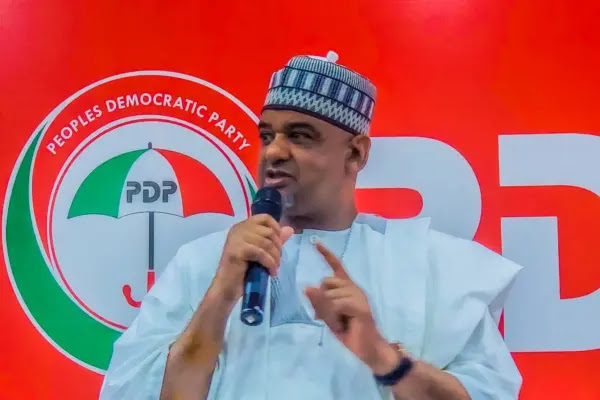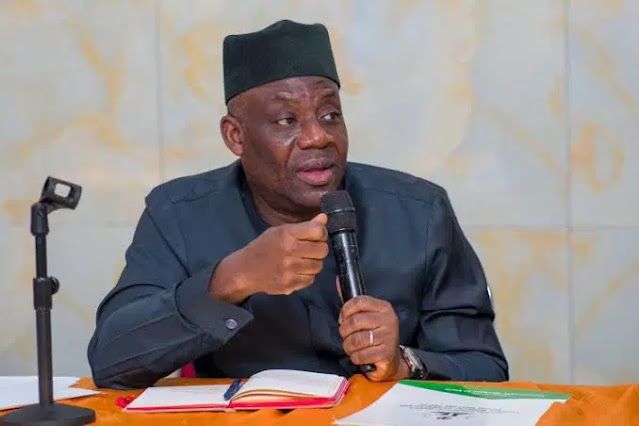In a pivotal move that signals a strategic shift for Nigeria’s leading opposition party, the Peoples Democratic Party (PDP) has formally zoned its 2027 presidential ticket to the southern region of the country. The decision, ratified during the party’s 102nd National Executive Committee (NEC) meeting held on August 25, 2025, in a closed-door session, marks a departure from the more open arrangement of the 2023 presidential election cycle. Guided by the counsel of its founding fathers, the PDP resolved that its next presidential candidate must hail from the South, a decision driven by a consensus aimed at balancing regional interests and rebuilding trust within the party and among its supporters.
In a related development, the NEC also confirmed Ambassador Umar Iliya Damagum as the substantive National Chairman, a move expected to stabilize the party’s leadership and provide organizational clarity as it gears up for its delayed national convention. This report provides a comprehensive analysis of these decisions, their implications for the PDP’s future, and the broader political landscape in Nigeria.
The Zoning Decision: A Strategic Pivot for 2027
The PDP’s decision to zone its 2027 presidential ticket to the South represents a significant moment in the party’s history, reflecting its commitment to addressing Nigeria’s complex regional dynamics and fostering unity. Unlike the 2023 presidential primaries, where the party adopted a flexible approach by throwing the ticket open to candidates from all regions, the 2025 NEC meeting took a more deliberate stance. The closed-door session, attended by key party leaders, governors, and stakeholders, was marked by intense deliberations, with the zoning decision emerging as a cornerstone of the PDP’s strategy for the next election cycle.
According to multiple party insiders, the resolution to zone the presidential ticket to the South was heavily influenced by the advice of the PDP’s founding fathers, including elder statesmen who played a pivotal role in the party’s formation in 1998. These leaders argued that zoning the ticket to the South would address longstanding concerns about regional representation and demonstrate the party’s commitment to fairness and equity. The decision was also seen as a response to criticisms that the PDP’s open-ticket policy in 2023 contributed to internal divisions and weakened its electoral performance against the ruling All Progressives Congress (APC).
The zoning arrangement aligns with Nigeria’s unwritten political tradition of rotating power between the North and the South to ensure inclusivity in a country with diverse ethnic and regional identities. Since the return to democratic rule in 1999, both the PDP and the APC have often adhered to this principle, with presidents alternating between the two regions. For instance, former President Olusegun Obasanjo (South-West) served from 1999 to 2007, followed by Umaru Musa Yar’Adua (North-West) from 2007 to 2010, Goodluck Jonathan (South-South) from 2010 to 2015, and Muhammadu Buhari (North-West) from 2015 to 2023. The current president, Bola Ahmed Tinubu (South-West), assumed office in 2023, and his tenure is expected to shape the regional dynamics of the 2027 election.
By zoning its ticket to the South, the PDP aims to capitalize on the sentiment that the North will have held power for eight years by 2027, making it politically expedient for the South to produce the next president. Insiders revealed that the decision was driven by a desire to rebuild trust among southern stakeholders, who felt marginalized during the 2023 primaries when Atiku Abubakar, a northerner, emerged as the party’s candidate. The choice of Atiku, a veteran politician from Adamawa State, sparked controversy within the party, particularly among southern leaders like Nyesom Wike, then-governor of Rivers State, who argued that the South deserved the ticket after Buhari’s tenure.
The 2025 zoning decision is thus seen as a corrective measure, aimed at healing internal rifts and presenting a united front ahead of 2027. Party leaders believe that a southern candidate will resonate with voters in the South-East, South-South, and South-West, regions where the PDP has historically enjoyed strong support but faced challenges in 2023 due to internal divisions and the emergence of Peter Obi’s Labour Party. By prioritizing regional balance, the PDP hopes to strengthen its electoral prospects and position itself as a viable alternative to the APC.
The Deliberations: Consensus and Compromise
The 102nd NEC meeting, held in Abuja, was a critical gathering for the PDP, bringing together a diverse array of stakeholders, including members of the National Working Committee (NWC), state governors, former presidents, and representatives of the party’s Board of Trustees (BoT). The closed-door nature of the session underscored the sensitivity of the discussions, which focused on charting a path forward for the party after a turbulent period marked by leadership crises, defections, and electoral setbacks.
Insiders described the zoning decision as the result of a carefully negotiated consensus, with party leaders weighing the political, historical, and strategic implications of their choice. The founding fathers, including figures like former Vice President Alex Ekwueme and former Senate President Adolphus Wabara, played a pivotal role in advocating for a southern ticket. Their argument was rooted in the PDP’s founding principles, which emphasize inclusivity and the equitable distribution of power. They also highlighted the need to rebuild trust among party members and the electorate, particularly in the South, where the PDP’s support base has been eroded by internal conflicts and competition from other parties.
The decision was not without challenges. Some northern leaders within the party reportedly expressed concerns about the potential alienation of northern voters, who form a significant portion of Nigeria’s electorate. However, these concerns were mitigated by assurances that the PDP would prioritize northern candidates for other key positions, such as the vice-presidential ticket and party leadership roles, to maintain regional balance. The consensus-driven approach ultimately prevailed, with the NEC ratifying the zoning arrangement by a unanimous vote, signaling a rare moment of unity within the party.
The zoning decision also opens the door for a competitive primary process within the South, with potential candidates from the South-East, South-South, and South-West likely to vie for the ticket. Names like Nyesom Wike, Peter Obi (who contested under the Labour Party in 2023 but remains a prominent southern figure), and Seyi Makinde, the governor of Oyo State, have already begun to surface in political circles. The PDP’s challenge will be to manage the primary process in a way that avoids the factionalism that plagued the 2023 election cycle while selecting a candidate capable of unifying the party and appealing to a broad electorate.
Damagum’s Confirmation: A Step Toward Stability
In a related development, the NEC meeting also saw the ratification of Ambassador Umar Iliya Damagum as the PDP’s substantive National Chairman. Damagum, who hails from Yobe State in Nigeria’s North-East, had been serving as the acting National Chairman since March 2023, following the suspension of Iyorchia Ayu amid internal party disputes. His confirmation as the substantive chairman is seen as a critical step toward restoring stability and providing organizational clarity as the PDP prepares for its national convention, which has been delayed due to procedural hurdles and leadership uncertainties.
Damagum’s tenure as acting chairman was marked by efforts to reconcile feuding factions within the party, particularly between the camps of Atiku Abubakar and Nyesom Wike. His diplomatic approach and ability to navigate the party’s complex internal dynamics earned him the support of key stakeholders, including governors and members of the BoT. The NEC’s decision to confirm him as the substantive chairman reflects confidence in his leadership and a desire to avoid further disruptions as the party gears up for 2027.
Party leaders described Damagum’s confirmation as a move to “steady the ship” after a period of turbulence. The PDP has faced significant challenges in recent years, including defections to the APC, internal power struggles, and a loss of public confidence following its defeat in the 2023 presidential election. By solidifying its leadership structure, the PDP aims to project an image of unity and readiness as it approaches its national convention, which is expected to set the stage for the 2027 campaign.
The confirmation also has implications for the party’s organizational strategy. As National Chairman, Damagum will oversee the planning and execution of the national convention, where key decisions about the party’s leadership, constitution, and electoral strategy will be made. His role will be crucial in ensuring that the convention is inclusive and transparent, addressing the procedural hurdles that have delayed previous gatherings. Additionally, Damagum’s leadership will be tested as he navigates the selection of a southern presidential candidate, a process that could reignite tensions if not managed carefully.
The Broader Context: Nigeria’s Political Landscape
The PDP’s zoning decision and Damagum’s confirmation come at a critical juncture in Nigeria’s political history. The country is grappling with a range of challenges, including economic hardship, insecurity, and growing public disillusionment with the political class. The APC, under President Bola Tinubu, has faced criticism for its handling of these issues, creating an opportunity for the PDP to position itself as a credible alternative in 2027.
However, the PDP faces significant hurdles of its own. The party’s performance in the 2023 elections, where it lost the presidency and several governorships, exposed its vulnerabilities, including internal divisions and a failure to connect with younger voters. The emergence of Peter Obi’s Labour Party, which drew significant support from the South-East and urban areas, further complicated the PDP’s electoral strategy. By zoning its ticket to the South, the PDP hopes to reclaim support in these regions while addressing the perception that it has been dominated by northern interests in recent years.
The zoning decision also has implications for Nigeria’s broader political dynamics. The South-East, in particular, has long advocated for a president of Igbo extraction, arguing that the region has been marginalized since the civil war ended in 1970. The PDP’s decision to zone its ticket to the South could provide an opportunity for a South-Eastern candidate to emerge, potentially reshaping the party’s relationship with the region. However, competition from the South-West and South-South, where figures like Wike and Makinde hold significant influence, could complicate the primary process.
The confirmation of Damagum as National Chairman also signals the PDP’s intent to strengthen its organizational structure in preparation for a challenging election cycle. With the APC likely to field a northern candidate in 2027 to counter the PDP’s southern strategy, the PDP will need a cohesive and disciplined campaign to compete effectively. Damagum’s leadership will be critical in mobilizing the party’s grassroots, reconciling factions, and crafting a message that resonates with Nigeria’s diverse electorate.
Reactions and Perspectives
The PDP’s zoning decision and Damagum’s confirmation have elicited a range of reactions from party members, political analysts, and the public. Supporters of the zoning arrangement argue that it demonstrates the PDP’s commitment to fairness and regional balance, positioning it as a party that listens to its constituents. “This is a bold and necessary move,” said Chijioke Okonkwo, a PDP chieftain from Anambra State. “The South has been patient, and this decision shows that the party values unity and equity.”
However, some northern members expressed cautious optimism, emphasizing the need for the PDP to ensure that northern interests are not sidelined. “Zoning is part of our political tradition, but the party must ensure that the North remains engaged and represented,” said a party official from Kano State, speaking on condition of anonymity. The promise of a northern vice-presidential candidate and other leadership roles is likely to address these concerns, but the PDP will need to tread carefully to avoid alienating its northern base.
Political analysts have praised the zoning decision as a strategic move to regain ground in the South, particularly in the South-East and South-South, where the PDP lost significant support in 2023. “The PDP is learning from its mistakes,” said Dr. Aisha Mohammed, a political scientist at the University of Lagos. “By zoning the ticket to the South, the party is signaling its intent to rebuild trust and compete effectively against the APC and Labour Party.”
Damagum’s confirmation has also been met with approval, with many viewing it as a step toward resolving the leadership crises that have plagued the PDP. “Ambassador Damagum has shown he can bring people together,” said Senator Aisha Ibrahim, a member of the NEC. “His confirmation gives us the stability we need to focus on the bigger picture—winning in 2027.”
Public reactions, as seen on social media platforms like X, have been mixed. Some Nigerians expressed hope that the PDP’s zoning decision would lead to a more inclusive political process, while others remained skeptical, citing the party’s history of internal conflicts. “Zoning is good, but the PDP needs to show it can deliver on its promises,” wrote one user. “We’re tired of politics as usual.”
Challenges and Opportunities Ahead
As the PDP prepares for 2027, it faces both challenges and opportunities. The zoning decision, while a step toward unity, could reignite tensions if the primary process is not managed transparently. The party will need to ensure that all southern regions—South-East, South-South, and South-West—feel represented in the selection of the presidential candidate. Additionally, the PDP must address the concerns of its northern members to maintain a cohesive national strategy.
The confirmation of Damagum provides an opportunity to strengthen the party’s organizational structure, but his leadership will be tested by the complexities of managing a diverse and often fractious party. The national convention, expected to take place in 2026, will be a critical moment for the PDP to present a united front and articulate a clear vision for Nigeria’s future.
On the national stage, the PDP must contend with a formidable APC, which has significant resources and control of the federal government. The Labour Party, led by Peter Obi, also remains a wildcard, particularly in the South and among younger voters. To succeed in 2027, the PDP will need to craft a compelling narrative that addresses Nigeria’s pressing issues—economic recovery, security, and youth empowerment—while leveraging its southern candidate to broaden its appeal.
Conclusion
The PDP’s decision to zone its 2027 presidential ticket to the South, coupled with the confirmation of Ambassador Umar Iliya Damagum as National Chairman, marks a defining moment for the party as it seeks to reposition itself for the next election cycle. The zoning arrangement, driven by a consensus among the party’s founding fathers and stakeholders, reflects a commitment to regional balance and inclusivity, addressing past grievances and setting the stage for a competitive primary process. Damagum’s confirmation provides much-needed stability, paving the way for the PDP to address procedural hurdles and prepare for its national convention.
As Nigeria navigates a complex political landscape, the PDP’s strategic moves signal its intent to reclaim its position as a leading force in the country’s democracy. By zoning its ticket to the South and solidifying its leadership, the party is laying the groundwork for a unified and forward-looking campaign. However, the road to 2027 will be fraught with challenges, from managing internal dynamics to competing with a formidable ruling party and emerging political forces. The PDP’s ability to seize this moment, build on its decisions, and connect with Nigeria’s diverse electorate will determine its success in shaping the country’s future.






